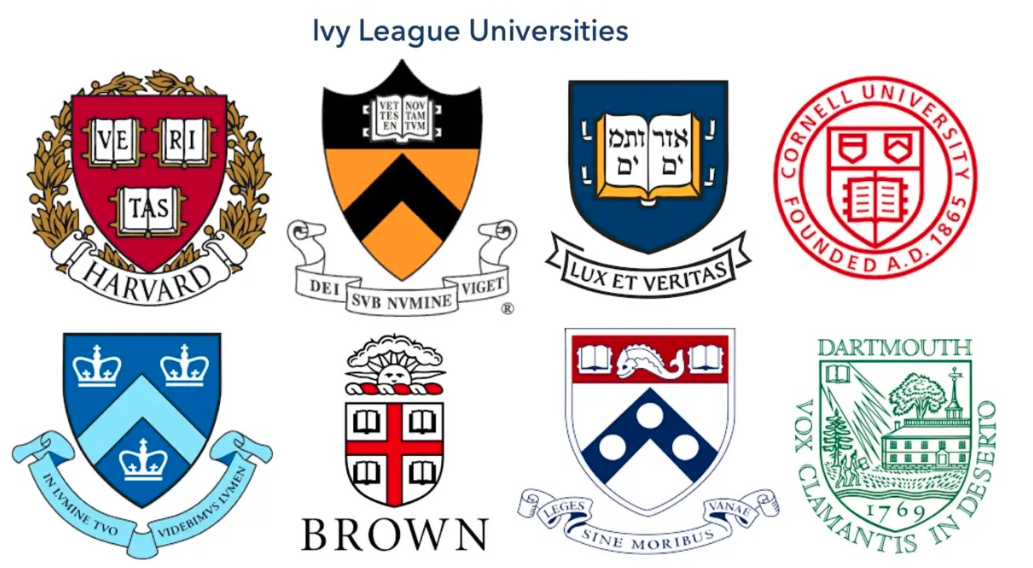
The Ivy League represents a group of eight (8) prestigious Universities in the United States known for their high academic standards, rich history & very significant contributions to education and society worldwide. These institutions include Harvard University, Yale, Princeton, Columbia, Brown, Dartmouth, Cornell & the University of Pennsylvania. For overseas students researching university options, understanding the significance of Ivy League schools and considering various factors before admission is crucial to making an informed decision.
Importance of Ivy League Schools
Ivy League schools are synonymous with academic excellence, selectivity in admissions, and a history of producing leaders in various fields. Attending an Ivy League college or university can offer unparalleled opportunities for networking, research, & most importantly career advancement. The prestige associated with these institutions can significantly impact one’s professional trajectory & ultimately their future.
Factors to Consider for University Admission
- Academic Programs: Evaluate the strength and reputation of the academic programs relevant to your field of interest. Ivy League schools often have renowned faculty and extensive resources for research and innovation.
- Cultural Fit: Consider the campus culture and student life. Each Ivy League school has a unique atmosphere, from the urban setting of Columbia in New York City to the more rural, intimate campus of Dartmouth in New Hampshire. Understanding the social environment is crucial for your overall university experience.
- Financial Considerations: International students should thoroughly research scholarship opportunities, financial aid, and the overall cost of attendance. Ivy League schools can be expensive, but many offer generous financial aid packages to international students based on need.
- Admission Requirements: Familiarize yourself with the specific admission requirements for international students, including standardized test scores (SAT, ACT, TOEFL, IELTS), essays, letters of recommendation, and extracurricular achievements. The admissions process is highly competitive, so understanding what each school values can give you an edge.
- Career Opportunities: Investigate the career support services and alumni network of each school. Ivy League universities often have strong ties to industries and can facilitate internships, mentorships, and job placements.
- Location and Lifestyle: The geographical location of each school can significantly impact your college experience. Consider the climate, proximity to major cities, and lifestyle options available in the surrounding area.
- Diversity and Inclusion: Look into the diversity of the student body and the availability of support services for international students. A diverse campus environment can enhance your learning experience and help you build a global network.
Making the Right Decision
Choosing the right Ivy League school involves a balance of personal, academic & of course financial considerations. It’s important to research extensively, reach out to current students or alumni, and possibly visit campuses if feasible. Remember, the goal is to find an institution where you can thrive academically, socially & personally.
For overseas students, the decision to apply to an Ivy League school should be informed by a thorough understanding of what each university offers and how it aligns with your personal and academic goals. The prestige of Ivy League institutions comes with high expectations and a competitive environment, so it’s essential to assess whether this aligns with your educational aspirations and well-being.
Detailed Information on Ivy League Schools:
Ivy League schools are renowned for their storied histories, academic excellence, and highly selective admissions processes. They include:
- Harvard University: Known for its rich history, Harvard boasts a global reputation for excellence in various disciplines.
- Yale University: Yale is celebrated for its comprehensive undergraduate education and vibrant campus life.
- Princeton University: Renowned for its strong emphasis on undergraduate humanities and research opportunities.
- Columbia University: Located in New York City, Columbia offers a unique blend of urban culture and academic rigor.
- University of Pennsylvania: Penn is known for its interdisciplinary approach, blending liberal arts with professional education.
- Brown University: Brown’s open curriculum fosters student autonomy in academic pursuits.
- Dartmouth College: Dartmouth emphasizes undergraduate education with a close-knit community and strong alumni network.
- Cornell University: Cornell is unique for its combination of Ivy League and land-grant institution status, offering a wide range of programs.
Admission to these institutions is highly competitive, with acceptance rates often below 10%. Prospective students must demonstrate exceptional academic achievements, standardized test scores, extracurricular involvement & personal qualities. The benefits of attending an Ivy League school include unparalleled educational resources, networking opportunities & career prospects post-graduation.
We’re hoping this article helps you in making the right choice on which Ivy League school you would like to get in to.






